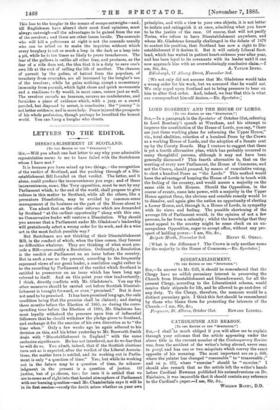LETTERS TO THE EDITOR.
DISESTABLISHMENT IN SCOTLAND.
[TO THE EDITOR OP THE " SPECTATOR."1
.SIR,—Will you admit one last letter to say why your admirable expostulation seems to me to have failed with the Scotchmen whom I have met P
It is because you have mixed up two things,—the recognition of the verdict of Scotland, and the pushing through of a Dig- establishment Bill founded on that verdict. The latter, and it alone, could produce the inconveniences you urge ; and of these inconveniences, some, like Tory opposition, must be met by any Parliament which, to the end of the world, shall propose to give redress in this matter to Scotland, while all the others, like a premature Dissolution, may be avoided by common-sense management of its business on the part of the House about to sit. You admit that on the other reforms which are demanded by Scotland "at the earliest opportunity" along with this one, no Conservative leader will venture a Dissolution. Why should you assume that a Parliament under Mr. Gladstone's leadership will gratuitously select a wrong order for its work, and do a wise act in the most foolish possible way P
But Scotchmen are not thinking of their Disestablishment Bill, in the conduct of which, when the time comes, they foresee no difficulties whatever. They are thinking of what must pre- cede a Bill—presumably a Resolution. Ordinarily, a Resolution is the verdict of Parliament on an issue before the country. But in such a case as the present, according to the frequently expressed views of our great leader, a resolution ought rather to be the recording by Parliament of the verdict which Scotland is entitled to pronounce ou an issue which has been long ago referred to itself. And on this point your view inadvertently, I think, directly conflicts with Mr. Gladstone's. You say the other measures should be carried out before Scottish Disestab- lishment is brought forward, or even," promised." But it does not need to be promised. It has been promised long ago, the only condition being that the promise shall be claimed ; and during these months before the Election of 1885, as during the corre- sponding time before the Election of 1880, Mr. Gladstone has most loyally withstood the pressure upon him of influential followers that he should withdraw the pledge given to Scotland, and exchange it for the exercise of his own discretion as to "the time when." Only a few weeks ago he again adhered to his decision on this, and his letter yesterday to Mr. Bosworth Smith deals with "Disestablishment in England" with the same exclusive significance. He has not interfered, nor do we fear that he will do so. You admit, indeed, that if the Scottish elections turn out as is expected, after the verdict of the Liberal Associa- tions, the matter here is settled, and its working out in Parlia- ment is only " a question of time." Yes; but while its working out in the future may be a question of time, its acknow- ledgment in the present is a question of justice. Of justice, but of prudence, too ; for once it is settled that we are to come as of right into that heated atmosphere of Parliament with our burning question—and Mr. Chamberlain says it will be i❑ its first session—surely the doubt arises whether on your own
principles, and with a view to your own objects, it is not better to isolate and extinguish it at once, admitting what you know to be the justice of the case. Of course, that will not pacify Tories, who refuse to have Disestablishment anywhere, and whom Mr. Gladstone formally challenged in the debate of 1878 to contest his position, that Scotland has now a right to Dig- establishment if it desires it. But it will satisfy Liberal Scot- land, which has waited in patient heart-sickness year after year, and has been loyal to its covenants with its leader until it can now approach him with an overwhelmingly conclusive claim.—I
[We not only did not assume that Mr. Gladstone would take a wrong order for his work, but we assumed that he would not. We only urged upon Scotland not to bring pressure to bear on him to alter that order. And, indeed, we fear that this is what our correspondent himself desires.—ED. Spectator.]














































 Previous page
Previous page